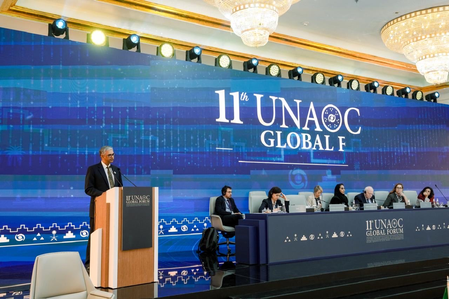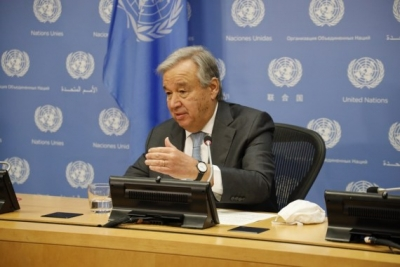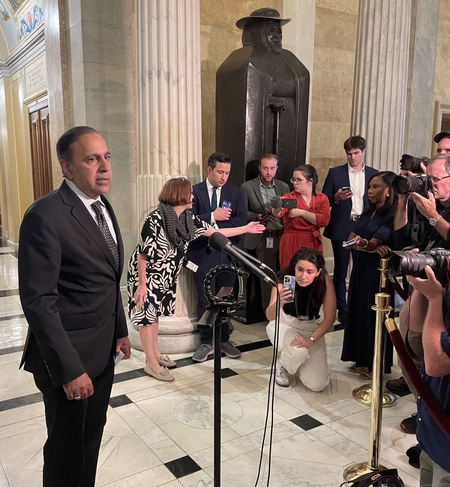
Nice (France), June 9 (IANS) French President Emmanuel Macron on Monday warned that “the globe is burning, the oceans are boiling” as nations face pressure to adopt tougher stances on overfishing, pollution and marine protection.
Opening the third UN Ocean Conference (UNOC3) in the southern French city of Nice, Macron, amidst the gathering of over 150 countries, made an urgent call for multilateral mobilisation to save the oceans.
“All the initiatives we undertake in favour of the oceans aim at sustainable development in its three dimensions: economic, social and environmental,” he said in his address.
“And the stakes are high for developing countries in general, and for small island states in particular. For millennia, these nations have relied upon oceans as trade routes, sources of tourism, food reserves, links to ancient cultures and vital resources for their survival.
“To succeed, we must finance our ambitions. And we must do it, together. We cannot ignore that Sustainable Development Goal 14 is one of the least funded. Accelerating ocean action requires significant and accessible funding, including through the fulfilment of existing commitments,” the host nation President Macron said.
“It also requires strengthening the means of implementation for developing countries. I therefore look forward to the adoption of the conference’s political declaration that I had the honour to present, thanks to the excellent coordination of the Permanent Representatives of Australia and Cabo Verde, as well as the voluntary commitments that will be announced in the coming days.”
“I also hope for ambitious outcomes at the Fourth International Conference on Financing for Development, in the coming weeks. The future of our oceans is in our hands. Here in Nice, let us reaffirm that international cooperation works effectively and is essential to ensuring a better future for all.”
President Macron said several commitments made at the 2022 Ocean Conference have been realised. Over 2,000 voluntary commitments have been recorded by governments, civil society and the private sector.
The third UN Ocean Conference (UNOC3), the largest ocean summit ever organised, is bringing together a wide range of stakeholders, including governments, international organisations, civil society, the private sector, and academia.
The ocean powers 80 per cent of global trade and supports jobs, food security and climate action. But climate change, pollution and underinvestment threaten its future. However, the scientific community calls for urgent action to protect the deep from the destruction of bottom trawling.
The 2025 UN Ocean Conference, co-hosted by the governments of France and Costa Rica, opened with strong calls to accelerate action and mobilise all actors to conserve and sustainably use the ocean.
“I urge all countries to come forward with bold pledges,” United Nations Secretary-General António Guterres said in his opening remarks to the conference.
“We live in an age of turmoil, but the resolve I see here gives me hope,” he said, adding, “Hope that we can turn the tide.”
President Rodrigo Chaves Robles of Costa Rica stated that “this summit must be remembered as the time when the world understood that looking after the ocean is not simply an option. Rather, it is a moral, economic, and indeed, we need minimum protection.”
The ocean is under growing pressure from climate change and human activity, with record heat severely impacting marine life, and escalating threats from pollution, overfishing and biodiversity loss pushing marine ecosystems to the brink.
The summit that will last till June 13 is expected to adopt an inter-governmentally negotiated political declaration, which, along with a registry of voluntary commitments from across sectors, will be referred to as the Nice Ocean Action Plan — outcomes aimed at catalyzing urgent, inclusive, and science-based action to safeguard the ocean for present and future generations.
“The time for incremental progress is over. We need billions, not millions, in investment. We need binding commitments that survive political transitions and economic pressures,” United Nations Under-Secretary-General Li Junhua, the Conference Secretary-General, said at the opening.
Key issues under discussion during the five-day conference include: The Marine Biodiversity Treaty (BBNJ Agreement); sustainable fisheries; marine protected areas; decarbonising maritime transport; plastic pollution; and financing.
(Vishal Gulati can be contacted at vishal.g@ians.in)
–IANS
vg/skp




